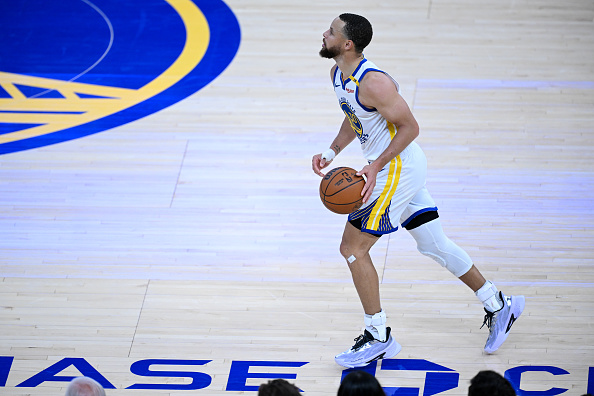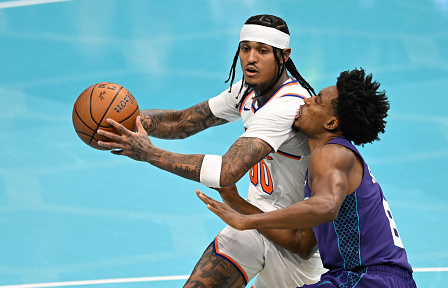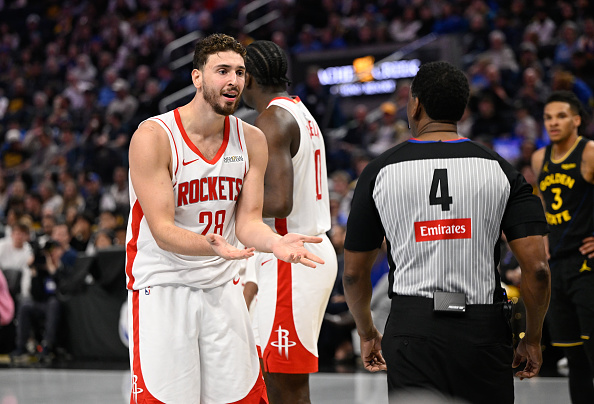Huge contracts are given out every offseason. Sometimes the players receiving these huge contracts live up to them, but often they don’t. Giving a big contract to a player that does not live up to can be greatly detrimental to a franchise and ruin their championship window for years to come. Here are some of the worst contracts currently in the NBA, some of which are holding their teams back big time.
Ian Mahinmi – Washington Wizards
Contract: 4 years, $64 million (Free agent: 2020/Unrestricted)
Ian Mahinmi signed with the Washington Wizards in 2016 after having the best year of his career the previous season with the Indiana Pacers. During that campaign, he averaged 9.3 points per game, 7.1 rebounds per game, 1.1 blocks per game, while starting 71 games and averaging 25.6 minutes per game; all of which are career highs. Since then, through three years of his contract, he has not come close to those averages. In three seasons with Washington, Mahinmi has averaged only 5.5 points per game, 0.6 blocks per game, and 4.2 rebounds per game. He has also started only 6 games since signing that huge contract, averaging 15.5 minutes per game.
Although Mahinmi had career highs in many categories in the 2015 season, Ernie Grunfeld was out of his mind to sign him to a contract of this size. With the way the NBA is going, traditional big men are not a hot commodity anymore, plummeting Mahinmi’s value due to his lack of shooting range. With all of that being said, Washington is now led by a new GM, Tommy Sheppard, and will be free of Mahinmi’s contract after next season. Sheppard has stepped into an ugly situation with multiple bad contracts taking up the majority of their cap space. Hopefully, he will learn from Grunfeld’s mistakes and begin to turn the franchise around.
Andrew wiggins – Minnesota timberwolves
Contract: 5 years, $147.7 million (Free agent: 2023/Unrestricted)
Andrew Wiggins was drafted first overall in the 2014 NBA Draft by the Cleveland Cavaliers. He was traded to the Minnesota Timberwolves in a blockbuster deal for Kevin Love before he even played a single NBA game. He was proclaimed as the next big thing since his high school days, but he has not come close to living up to that hype.
Wiggins had a career year in 2016, setting career highs across the board, including 23.6 points per game. The Timberwolves saw this as a great time to ink the then 21-year-old to a huge extension, as it seemed that Wiggins had figured things out and was turning into a superstar. To put it lightly, things have not turned out the way the Timberwolves had hoped.
In the 2018-2019 season, the first year that his kicked in, he averaged 18.1 points per game, 4.8 rebounds per game, and 2.5 assists per game. Those numbers don’t look terrible on paper, but he is one of the least efficient players in the league and is a liability on the defensive end. Last season, his Player Efficiency Rating was 12.42, which ranks 217th in the NBA.
Wiggins is only 24 years old, meaning there is plenty of time for him to put it all together. This could very well happen, given his gifted athleticism. But, as of now, the Timberwolves are stuck paying an average annual salary of $29.5 million to a player who they might be better off without. Wiggins will have to find consistency in his game and improve greatly in order to live up to his contract.
Chandler parsons – atlanta hawks
Contract: 4 years, $94 million (Free agent: 2020/Unrestricted)
Chandler Parsons was drafted in the second round of the 2011 NBA Draft, and his career got off to a very promising start. He quickly became a solid two-way player in his three seasons with the Rockets, while shooting 37 percent from behind the arc. He was also a solid player for the Mavericks before tearing his meniscus in 2016. He signed a four-year, $94 million contract with the Grizzlies the following offseason, and it has all gone downhill from there.
Parsons was rarely ever healthy with the Grizzlies, starting 34 games in 2016, 8 in 2017, and only three last season. In his three seasons in Memphis, he averaged only 7.2 points per game and shot 34.1 percent from three-point range, while averaging only 19.6 minutes per game. It got so bad that Parsons left the team indefinitely in January as the two sides worked on a plan for his future.
The Grizzlies have since given up on Parsons, trading him to the Hawks for Solomon Hill and Miles Plumlee, in a trade full of bad contracts. It’s a shame that knee injuries have put a damper on Parson’s career, as it seemed he had a promising career ahead of him. He will be an unrestricted free agent in the summer of 2020, but he should not expect to see the type of contract he received from Memphis anytime soon.
nicholas batum – charlotte hornets
Contract: 5 years, $120 million (Free agent: 2021/Unrestricted)
Nicholas Batum was acquired by the Hornets in 2015 in a trade with the Trail Blazers. This seemed like a decent deal at the time, as Batum is a good two-way player. After putting up good numbers in the first two years of his deal, his production has taken a dive. Last season, he averaged only 9.3 points per game with a Player Efficiency Rating of 11.87, good for 243rd in the NBA among qualified players. He is getting paid like a team’s number one option, yet his numbers prove he is nowhere near that.
Batum has two years left on his contract, one being a $27 million player option which he undoubtedly will opt into. Being in a rebuilding stage, the Hornets are in a tough situation with this contract. Batum is not a terrible player by any means; he is a nice role player that does a few things well and can make a positive impact on games. But the fact that they are paying him as if he is a game-changing player, it is just not an ideal situation. Considering that his contract is basically untradeable at this point, the Hornets will have to ride out the contract and learn from this mistake in the future.
chris paul – oklahoma city thunder
Contract: 4 years, $159.7 million (Free agent: 2022/Unrestricted)
Including Chris Paul in this list is by no means a knock on his career. He is one of the best players of his era and made great contributions to the Rockets during his time there. But signing a then 33-year-old to a mammoth contract extension like that usually does not work out very well. And now, a year into his extension, the Rockets have gone in a different direction, and luckily were able to unload his contract onto the Thunder. Paul’s production was not terrible in Houston, as he seemed like a good fit alongside James Harden. But turmoil ensued after last season’s elimination from the playoffs.
Paul averaged 15.6 points per game while dishing out 8.2 assists per game last season. His PER was 19.76, ranking 49th in the league, comparable to the likes of Ben Simmons and Demar DeRozan. Despite decent production, Paul has often been injured throughout his career, playing only 58 games each of the last two seasons. It remains to be seen if the Thunder will keep him on their payroll, but as of now, his contract is their problem and will be difficult to move. No disrespect to CP3, but he is wildly overpaid for an aging point guard that is giving a team just average production at this point in his career.
Gordon Hayward – Boston Celtics
Contract: 4 years, $127.8 million (Free agent: 2021/Unrestricted)
Everything was going great for Gordon Hayward. He was becoming a superstar in the league, averaging 21.9 points per game in his final season in Utah. In 2017, he signed with the Celtics, reuniting with his college coach, Brad Stevens. He joined a plethora of young stars in Boston, and it looked like a very promising situation. But five minutes into his Celtic career, tragedy struck. Hayward came down awkwardly and severely dislocated his ankle and fractured his left tibia. Since then, he just hasn’t been the same player.
Last season, his first season back from the injury, he averaged only 11.5 points per game, while starting only 18 of the 72 games he appeared in. His three-point percentage was down, as were most of his stats across the board. His PER of 15.39 was also his worst since his rookie campaign. Hayward will be an unrestricted free agent in 2021, making an average salary of $33.4 million in the final two years of his contract. He will need to make a miraculous turnaround in order to make his contract look decent. This is not out of the question, but at this point, he is only a shell of his former self. One can only hope that he can recover and regain his old form, as he was an extremely fun player to watch when he was healthy.
john wall – washington wizards
Contract: 4 years, $171 million (Free agent: 2020/Unrestricted)
In 2017, the Wizards signed John Wall to a four-year, $171 million contract, hoping to secure their dynamic backcourt for the near future. Unfortunately, Wall will not be able to play during the first season that his extension kicks in. Wall slipped in his home and ruptured his Achilles, ruling him out for about a year.
Wall has been a very good point guard throughout his career, averaging 19 points per game and 9.2 assists per game, but his production fell off in his limited action last season. He has struggled to stay on the court and has looked disinterested at times in recent years. He has also had problems with teammates and coaches in the past.
He will be a free agent in 2023, making an average of $42.7 million through the duration of the extension. Even if he is healthy for the remainder of his contract, it will be hard to live up to a contract of this value. The Wizards may be better off trading him and rebuilding around Bradley Beal, but it will be an extremely difficult task to get rid of this contract. This may very well be the worst contract in the NBA currently and could cripple the franchise and keep them from contending for years to come.






